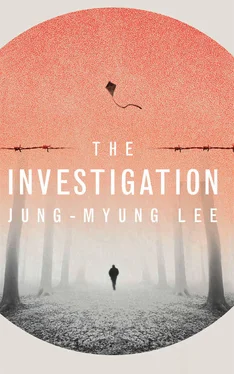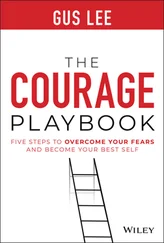I remain alive
Only because I am searching for what I lost.
It was a desperate confession. What had he lost? Sugiyama knew Dong-ju had lost everything — his country, his language, his name. Had he known long ago that he would be imprisoned, that he would be incarcerated on the other side of the wall?
Every night Sugiyama sat at his desk in his office, unable to sleep. He wanted to force the frail young man to write poems again. He wanted Dong-ju’s poems to survive these terrible times. Even if only a single person were to survive this war, he wanted the poems to be able to provide relief. It was all he thought about. He looked down at his desk, at the rough paper in his hands, his palms studded with calluses, his bent fingers, his broken nails. An old pen lay on the desk. An urge to write something came over him. He didn’t want to be a poet; he just wanted to write. He wanted to express on paper what was roiling inside him. He’d understood the world by seeing, hearing, touching, tasting and smelling. He’d seen bloodied corpses, heard deafening explosions and screams, touched the upturned earth and dust, smelled the smokiness of gunpowder and tasted blood. But his eyes no longer saw, his ears no longer heard. He’d started to decipher the world around him, appreciating the human side of the prisoners through the postcards given to him to censor and obtaining war news from the dailies. The world now existed for him through letters. He’d obtained a sixth sense.
He recalled what Dong-ju had told him: ‘The most important is the first sentence. If you write the first sentence properly, you can write all the way to the last one.’ Sugiyama cautiously picked up the pen as though he were handling a sea creature with dangerous tentacles. He dipped the nib in black ink, but couldn’t get started. He couldn’t even place it on the paper. The blank page in front of him was as bleak as the prison yard. What was he doing? He couldn’t write. He was a torturer who knew only how to beat people. He was a half-literate censor who burned the writings of others. He shook his head, but he couldn’t put the pen down.
The wind rattled the thin tin roof. The words in his head glinted like pieces of broken china in the dark. He picked up the dictionary and sped his way through unfamiliar nouns, adjectives, verbs. He took the glistening words and carefully strung them together, then revised them. He couldn’t tell what his endeavour would become.
Ten days passed. Or was it fifteen? Each night he stared into the darkness. He could hear the waves, the restless sea tossing and turning. He couldn’t fall asleep. Dawn neared. A gloomy foghorn sounded from the navy ship in far-away Hakata Bay. Sugiyama folded the piece of paper and slid it into his breast pocket.
Dong-ju was sitting dejectedly at the top of the hill, his arms around his knees. His soul seemed to have burrowed deep inside the shell of his body, and his dark eyes brimmed with despair and resentment.
Sugiyama approached him with the kite and spool he’d made. ‘Yun Dong-ju!’ he called. ‘How long are you going to remain like this? Enough! Get up! Do you want a beating?’
He tried to push away the guilt he felt from knowing that he was the cause of the young poet’s sorry state. With his club he prodded Dong-ju to check that he was all right; his forehead was gashed, his eyes were swollen and his lips were badly cut.
Sugiyama’s gaze wavered. He felt short of breath. His fingers trembled. This silent communication was the most truthful conversation he could offer, more sincere than an overwrought apology.
‘I knew you would walk out of solitary alive,’ he said, pleadingly. ‘Now that you’re out, you need to write.’ He wanted to read Dong-ju’s words once again. He wasn’t alone; all the prisoners — even the guards — hoped to hear him whistle, fly his kite and write their postcards again.
‘How cruel of you,’ Dong-ju finally replied, in a voice as arid as though he’d been buried alive. ‘What right do you have to tell me to write poems? To risk my life?’
‘I don’t. That’s true. You can say I have no shame. That’s true, too. But don’t stop writing poems. You have to stop destroying yourself.’ Sugiyama was caught off-guard by the sound of his own desperate voice.
‘Why?’ Dong-ju spat back harshly. ‘Why shouldn’t I destroy myself, when the whole world is going insane?’
Sugiyama was stumped. That angered him. He couldn’t use his club to force Dong-ju to write poetry; nothing could do that. ‘Fuck!’ Sugiyama spat out. ‘Do whatever you want.’ He raged silently at the cruel god who bestowed on Dong-ju the talent for refined language while taking away his mother tongue. Dong-ju’s gift wasn’t a blessing, it was a curse.
Sugiyama knew he should do something about this state of affairs, instead of just hating it. He should try to repair this vulnerable soul he’d wrecked. He rummaged around in his inner pocket and pulled out a crumpled piece of paper. ‘Look! Look at this. It’s a poem.’
The words pulled Dong-ju’s gaze like bait. Sugiyama wasn’t quite sure if what he’d written was a poem. But if Dong-ju was right, if the truth could be poetry, then perhaps his scribbling could be a poem, too. His were a few unspectacular lines, but they weren’t a lie. He hadn’t been a guard or a censor when he wrote them; he had been true to himself. ‘I can’t believe it either, but I picked up a pen and wrote this. Do you know why?’ He spoke urgently. ‘I wanted to show that someone like me could write poems. What’s your excuse?’
Dong-ju smiled, fatigued, as though he’d just returned from a long journey. He shook his head sorrowfully, with the grief of a poet who could no longer write, the anguish of a singer who could no longer sing.
Sugiyama realized he was breathing raggedly and tried to calm himself. ‘Why do you refuse to write?’
‘Because we Koreans are only allowed to write in Japanese,’ Dong-ju explained heavily.
Sugiyama felt his head splicing in two. So language wasn’t simply a tool to convey meaning. It was the charter of a human being that contained a nation’s history; Dong-ju’s had shattered, been dumped on the bloodied floor of the interrogation room. And it was Sugiyama who’d done that to him.
‘It doesn’t matter whether your poems are in Korean or Japanese,’ Sugiyama insisted. ‘Because, in their essence, they’re your own.’
‘Why should I bother writing poems that nobody will read?’
Sugiyama’s eye twitched imperceptibly. ‘I’m going to read them. So write!’ He grabbed Dong-ju’s collar. ‘You’re a poet. You have to write. Poetry is the only proof that you’re alive. If your poems die, so do you.’
Dong-ju clenched his teeth. ‘I’m not dying. I’m walking out of this place on 30 November next year, on my own two feet.’
‘If you’re lucky, you might survive, but you can’t count on luck,’ Sugiyama urged. ‘Prisoners are continuing to die. If you can’t walk out of here, the poems in your head will be shut in forever.’
Dong-ju gazed up impassively at the sky. He no longer seemed interested in Sugiyama. The blue sky was reflected in his eyes.
Sugiyama offered the kite and the spool to Dong-ju. ‘Fine. If you don’t want to write, at least fly this kite. You liked doing that.’
Dong-ju’s eyes sparkled in momentary joy before he was again overtaken by resignation.
‘Everyone’s been waiting for you to come out of solitary and fly your kite.’ Sugiyama lifted his chin towards the yard where the prisoners were gathered around, talking excitedly.
He pressed the spool into Dong-ju’s hands. The prisoners looked at him expectantly. With the spool in hand, Dong-ju closed his eyes and gauged the force and direction of the wind. Sugiyama walked a few paces away, holding the kite. The wind picked up and Dong-ju began to run. Sugiyama gently let go of the kite. The spool spun, as though it had been waiting. The kite soared.
Читать дальше












